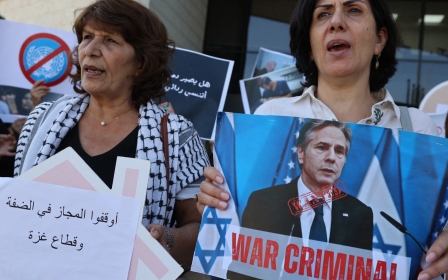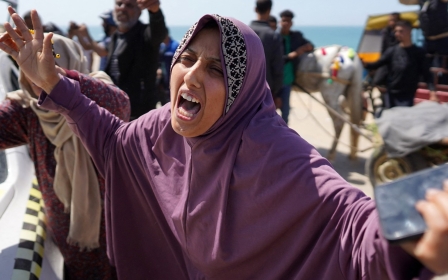Why Israel is expanding the Gaza war to the West Bank refugee camps

The refugee camps of Nur Shams and Jenin in the northern occupied West Bank are witnessing a comprehensive, Israeli-driven war of destruction. It is part of a plan to uproot Palestinian refugee camps, similar to ongoing events in Gaza and reminiscent of the 1948 Nakba.
This aligns with Israel’s vision of a war declared long ago on the UN agency for Palestinian refugees, Unrwa, which has reached its peak during the war on Gaza. Are things headed towards a forced displacement situation in the occupied West Bank?
The camps of Jenin and Nur Shams have been raided repeatedly in a process of uprooting that began before the war on Gaza. The northern occupied West Bank and the Jordan Valley have long been targeted for intensified settlement activity.
According to Unrwa, there are about 870,000 Palestinian refugees in the occupied West Bank, with many packed into dense camps, where community ties are strong. Israel views these camps as incubators of armed Palestinian struggle, as it seeks to eradicate the refugee issue and the right of return.
Since the 7 October Hamas attacks and Israel’s declaration of war on Gaza, top Israeli officials have reiterated the mantra of a long war - one that would last for years, changing the face of Gaza and the entire region. But this does not necessarily mean the war will achieve its objectives; it could achieve some goals, but it could also become a series of failures accumulated over years.
Stay informed with MEE's newsletters
Sign up to get the latest alerts, insights and analysis, starting with Turkey Unpacked
The talk of a years-long war runs contrary to Israel’s longstanding doctrine of swift, short-term wars to achieve maximum gains in the least amount of time to avoid repercussions. The war on Gaza has become one of the longest in Israel’s history, rivalling the War of Attrition with Egypt in 1969-70.
The ultimate goal of this war is to end the Palestinian question. It is being fought on one front, militarily, as the Biden administration contributes vast military resources towards a maritime port project that could facilitate the forced transfer of Palestinians from Gaza by sea, after Egypt rejected plans for a refugee influx into the Sinai.
Mass displacement
About 2.3 million people live in the densely packed Gaza Strip. After Israel launched its war, Rafah was intended to serve as a gathering point ahead of a mass displacement to the Sinai - but Egypt’s refusal of this scheme was supported by other Arab states, turning Rafah into an Israeli dilemma with no solution.
A wide-scale invasion of Rafah would exacerbate the catastrophe in Gaza, but if Israeli Prime Minister Benjamin Netanyahu backs down, he would lose his promised victory in the war, which he claims is just steps away.
Follow Middle East Eye's live coverage of the Israel-Palestine war
The war on refugee camps in the occupied West Bank aligns with the plans formulated by Finance Minister Bezalel Smotrich to massively expand settlements, while settlers have been rampaging through the territory, attacking Palestinians and setting fire to their land and property - all under the protection of the Israeli army.
Strategically frustrated and unable to achieve or retreat from its war objectives, at least under the ruling political class, Israel is headed towards uncontrollable escalation against refugee camps in the occupied West Bank, similar to what has unfolded in Gaza. Settlement expansion will not succeed while these camps remain internally cohesive, so Israel is rapidly working to dismantle them.
As Israel's comprehensive crisis deepens, its leaders are viewing escalation against the Palestinian people as a delusional way out
Several conclusions can thus be drawn from Israel’s war on West Bank refugee camps. This attempt to uproot refugees falls within the state’s broader annexation drive, which is also integral to the war on Gaza.
Forced displacement will likely occur in the occupied West Bank if this plan is not stopped. We cannot rely on the US, which uses its veto at the UN Security Council to shield Israel and to prevent the recognition of a Palestinian state - a move serving only to highlight the isolation and declining influence of this major world power, which coincides with Israel’s own declining regional influence.
The downfall of the Israeli government would be significant if it happens, but this would not be enough to present a new horizon for Palestinians, since there is no real political alternative to Netanyahu. Israeli policy is fundamentally stuck.
As Israel’s comprehensive crisis deepens, its leaders are viewing escalation against the Palestinian people as a delusional way out. Strengthening the presence, protection and survival of the Palestinian people should be the primary focus at this stage.
The views expressed in this article belong to the author and do not necessarily reflect the editorial policy of Middle East Eye.
Middle East Eye delivers independent and unrivalled coverage and analysis of the Middle East, North Africa and beyond. To learn more about republishing this content and the associated fees, please fill out this form. More about MEE can be found here.





